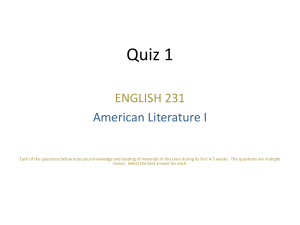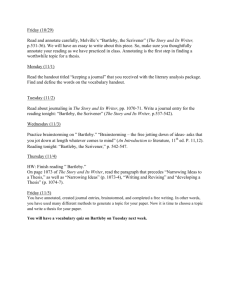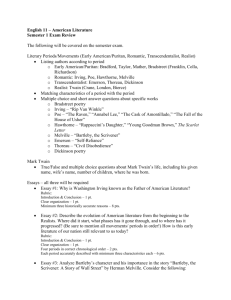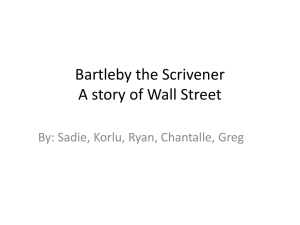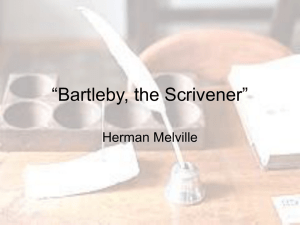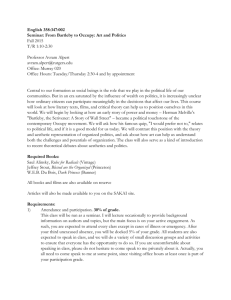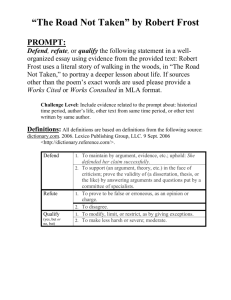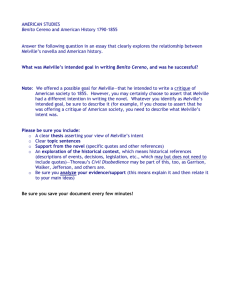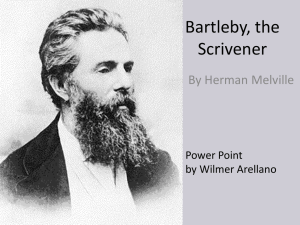Bartleby Prompts.doc - Kite
advertisement
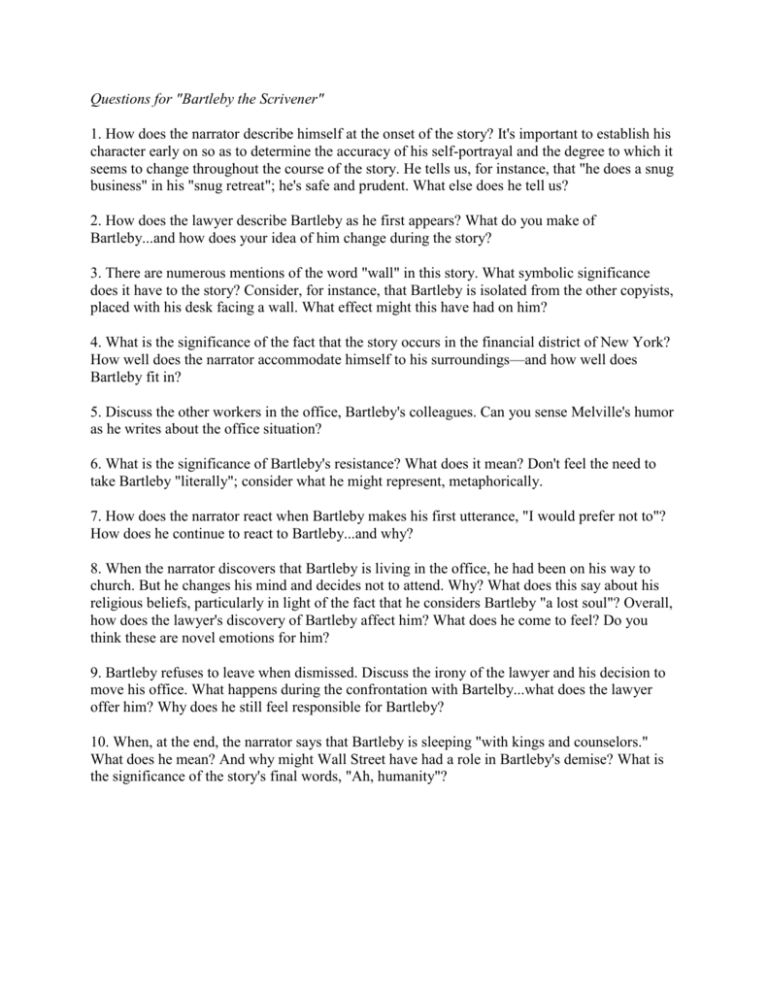
Questions for "Bartleby the Scrivener" 1. How does the narrator describe himself at the onset of the story? It's important to establish his character early on so as to determine the accuracy of his self-portrayal and the degree to which it seems to change throughout the course of the story. He tells us, for instance, that "he does a snug business" in his "snug retreat"; he's safe and prudent. What else does he tell us? 2. How does the lawyer describe Bartleby as he first appears? What do you make of Bartleby...and how does your idea of him change during the story? 3. There are numerous mentions of the word "wall" in this story. What symbolic significance does it have to the story? Consider, for instance, that Bartleby is isolated from the other copyists, placed with his desk facing a wall. What effect might this have had on him? 4. What is the significance of the fact that the story occurs in the financial district of New York? How well does the narrator accommodate himself to his surroundings—and how well does Bartleby fit in? 5. Discuss the other workers in the office, Bartleby's colleagues. Can you sense Melville's humor as he writes about the office situation? 6. What is the significance of Bartleby's resistance? What does it mean? Don't feel the need to take Bartleby "literally"; consider what he might represent, metaphorically. 7. How does the narrator react when Bartleby makes his first utterance, "I would prefer not to"? How does he continue to react to Bartleby...and why? 8. When the narrator discovers that Bartleby is living in the office, he had been on his way to church. But he changes his mind and decides not to attend. Why? What does this say about his religious beliefs, particularly in light of the fact that he considers Bartleby "a lost soul"? Overall, how does the lawyer's discovery of Bartleby affect him? What does he come to feel? Do you think these are novel emotions for him? 9. Bartleby refuses to leave when dismissed. Discuss the irony of the lawyer and his decision to move his office. What happens during the confrontation with Bartelby...what does the lawyer offer him? Why does he still feel responsible for Bartleby? 10. When, at the end, the narrator says that Bartleby is sleeping "with kings and counselors." What does he mean? And why might Wall Street have had a role in Bartleby's demise? What is the significance of the story's final words, "Ah, humanity"? 1. The narrator of Herman Melville’s Bartleby the Scrivener ends his story by sighing, “Ah, Bartleby! Ah, humanity!” Why does Melville identify his pathetic loner with all of humanity? What is he trying to say about the human condition in this novella? Support your answer with specific quotations from the story. 2. In Herman Melville’s Bartleby the Scrivener, the narrator attempts to help Bartleby, on several occasions motivated by verses from the Sermon on the Mount. Why does Melville portray religion as inadequate for the problems with which the unhappy scrivener is troubled? What is the author saying about Christianity and the human condition? 4. Near the end of Herman Melville’s Bartleby the Scrivener, the narrator says to the man who has taken over his old office, “The man you allude to is nothing to me - he is no relation or apprentice of mine, that you should hold me responsible for him.” Does Melville really believe that men are not responsible for one another - that I am not my brother’s keeper? Use specific quotations from the story to support your answer. 5. When the narrator introduces himself at the beginning of Herman Melville’s Bartleby the Scrivener, he describes himself by saying, “I am a man who, from his youth upwards, has been filled with a profound conviction that the easiest way of life is the best.” How accurate is this self-assessment? Does he always take the easy way out as the story progresses? Support your conclusion with specifics from the novella. 6. Evaluate the narrator of Herman Melville’s Bartleby the Scrivener as a businessman. Is he an effective and admirable employer? Why or why not? What does he tell us about himself while he is telling the story of Bartleby? Would you like to work for this man? Support your answer with specifics from the story. 7. Herman Melville’s Bartleby the Scrivener has at times been used by motivational speakers at business conferences to address that qualities of effective leadership on the job. What lessons do you think such speakers might draw from Melville’s classic? Support your answer with specifics and quotations from the story. 8. People today often speak of the dehumanizing effect of the business office, with its cookiecutter beige cubicles. To what extent do we find such an environment satirized in Herman Melville’s Bartleby the Scrivener? Is the office the target of the author’s satire rather than the people in it? Support your conclusion with specifics from the story. 11. Compare and contrast the picture of the meaninglessness of life found in Herman Melville’s Bartleby the Scrivener and Franz Kafka’s Metamorphosis. Be sure to consider both the ways life is pictured in the stories and the solutions proposed by the authors, if any. 13. To what extent does the title character change in Herman Melville’s Bartleby the Scrivener? Describe the changes that occur in his behavior. Are these accompanied by changes in attitude? What is the author trying to say in his treatment of Bartleby’s character development? 14. To what extent does the narrator change in Herman Melville’s Bartleby the Scrivener? Are these changes largely caused by Bartleby’s presence in his office? What is the author trying to say in his treatment of the narrator’s character development? 16. In Herman Melville’s Bartleby the Scrivener, are the title character and the narrator intended by the author to be foils? Why or why not? Support your answer with details from the story and indicate what ideas Melville is trying to communicate through the pairing of these two characters. 17. In Herman Melville’s Bartleby the Scrivener, many critics have pointed out the similarities in the personalities of the narrator and the title character. What are some of these similarities? Do the extreme forms of behavior in which Bartleby engages and the ways the lawyer responds to that behavior reveal the character of the lawyer? Why or why not? 18. Discuss the imagery of food found in Herman Melville’s Bartleby the Scrivener. Consider not only the role that food plays in the functioning of the law office, but also its associations with the different characters. What theme is Melville trying to develop through this imagery? Be sure to support your essay with specifics. 20. Some critics have argued that Herman Melville’s Bartleby the Scrivener is a study in chronic depression. To what extent is this an accurate description of the story? Is Melville concerned here with abnormal psychology, or does he have something else in mind? Discuss the significance of Bartleby’s extreme behavior in the light of the themes of the novella. 21. Some critics have argued that Herman Melville’s Bartleby the Scrivener is a study in manipulation. To what extent does the title character display what might be called a passive-aggressive personality? What might Melville be saying about the power of such behavior? How should such a person be treated? What advice would you give to the lawyer who narrates the story? 22. In Herman Melville’s Bartleby the Scrivener, what is the significance of the fact that Bartleby’s previous job had been in the Dead Letter Office? What light does this shed on his character? 23. In Herman Melville’s Bartleby the Scrivener, what does the title character seek through his behavior? Does he ever find what he seeks? Why or why not? Support your answer with specifics from the story. 24. In Herman Melville’s Bartleby the Scrivener, why does the narrator not eject Bartleby from the office? Are his motives purely altruistic, or does he have some selfish reason for keeping the odd scrivener around? Support your conclusion with details from the novella. 25. In Herman Melville’s Bartleby the Scrivener, what is the significance of the story being told from the point of view of one of its participants? Why do you think Melville chose a first-person narrative rather than using a third-person omniscient narrator, for instance? What impact does this choice have on the content of the story and the development of its themes? 29. Evaluate the mental condition of the title character in Herman Melville’s Bartleby the Scrivener. Is he mentally ill, and if so is he responsible for his actions? How does your answer to this question affect your assessment of the behavior of those around him, and of the themes of Melville’s story? 30. In Herman Melville’s Bartleby the Scrivener, the narrator at one point argues that “To a sensitive being, pity is not seldom pain. And when at last it is perceived that such pity cannot lead to effectual succor, common sense bids the soul be rid of it.” In other words, pity can only be sustained when there is hope of change. Evaluate this idea, discussing what it says about the narrator’s way of valuing others. Be sure also to give a biblical perspective on the question of when pity is and is not appropriate. 32. Herman Melville’s Bartleby the Scrivener is a study in profound alienation. To what extent does the author suggest that people can never really know one another? Has he any solution for this alienation? Why do the solutions he proposes fail? 35. In Herman Melville’s Bartleby the Scrivener, the author pictures the wealthy of his day as unable to empathize with the needs of those outside the mainstream of society. Why does he think this is true? What solution does he propose, if any? What solutions does he picture as inadequate?
